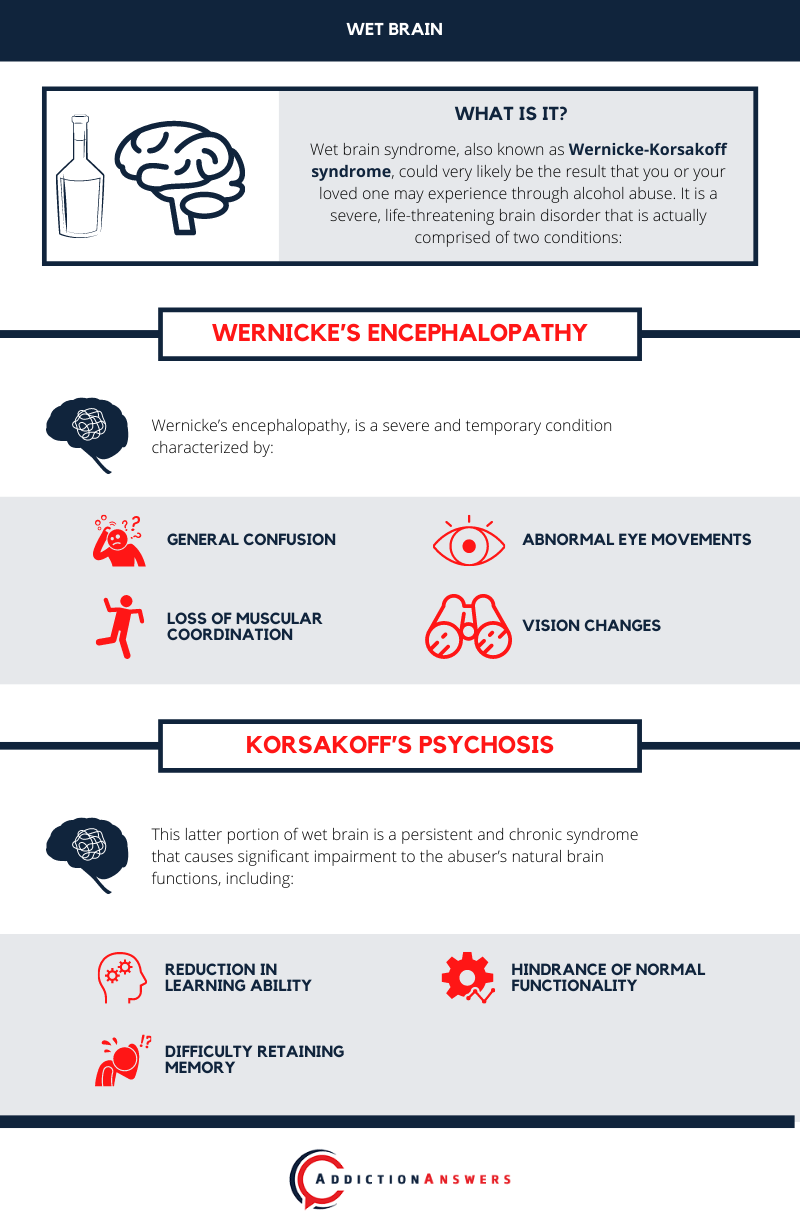Table of Contents
Alcohol is the most popular legal drug in the United States, with millions of Americans drinking at least once a year. That being said, it’s also the drug that’s most likely to be abused. Alcohol abuse is an all too common aspect of drinking alcoholic beverages for many people, and all for reasons unique to the abuser.
Do you know of someone who may abuse alcohol? Maybe that someone is you? If that’s the case, you might be familiar with a term called wet brain syndrome. This strange term pertains to a condition that’s a problematic result of constant drinking, and is more common than you might think.
So, what is wet brain, exactly? You’ve come to the right place to find the answers that you need. This article will talk about wet brain syndrome so you can be more aware of this condition. Read on to find out more.
Table of Contents
What Is Wet Brain Syndrome?
Our brains are an intricate muscle that relies on an intricate balance of vitamins, nutrients, and other important natural substances to keep it working properly. However, as with most other drugs, alcohol has the ability to affect our brains and the substance levels within them. When alcohol is drunk sparingly, the effects tend to be minuscule and don’t leave long-term problems; however, in the case of alcohol abuse, your brain is likely to suffer some chronic effects.
Wet brain syndrome, also known as Wernicke-Korsakoff syndrome, could very likely be the result that you or your loved one may experience through alcohol abuse. With wet brain syndrome, your brain experiences a drastic deficiency in vitamin B1 or thiamine. Thiamine deficiency tends to be spotted in individuals that have poor nutrition habits, but is a common result of long-term heavy drinking.
What Are the Symptoms?
Wet brain isn’t just something that can cause harm within the first few weeks of heavy drinking, nor is it something that only appears after many months or years of alcohol abuse; instead, it can produce both temporary and chronic symptoms based on one’s drinking habits.
There are two main parts to wet brain, or Wernicke-Korsakoff syndrome. Here are just a few symptoms you may see in both stages of this syndrome.
Short-Term (Temporary) Symptoms
The first part of Wernicke-Korsakoff syndrome is known as Wernicke’s encephalopathy. Although this is a short-term effect, it is still a very serious condition. This portion of wet brain syndrome has a few key characterizations that tend to be spotted in most alcohol abusers who reach this stage, including:
- General Confusion: The abuser may show bouts of confusion similar to short-term memory, such as where they may be, what they were working on, or why they were carrying out a specific task.
- Loss of Muscular Coordination: You or your loved one may temporarily lose control of your muscles and see a great reduction in overall coordination, which could result in injuries.
- Abnormal Eye Movements: It’s not uncommon for someone experiencing Wernicke’s encephalopathy to showcase irregular and erratic movements of the eye, most likely ones that they cannot control.
- Vision Changes: There’s a good chance that someone in the short-term stages of wet brain syndrome may experience variations in their vision that causes them to lack proper focus.
Long-Term (Chronic) Symptoms
If an abuser continues to commit to heavy drinking despite the short-term symptoms presented during Wernicke’s encephalopathy, they will likely experience the second stage of wet brain syndrome called Korsakoff’s psychosis. This latter portion of wet brain is a persistent and chronic syndrome that causes significant impairment to the abuser’s natural brain functions, including:
- Reduction in Learning Ability: You or your loved one may experience challenges in learning even basic ideas and acquiring and retaining knowledge.
- Difficulty Retaining Memory: People who experience Korsakoff’s psychosis often have difficulty retaining their memories, and often showcase memory loss with memories and experiences they should otherwise be able to retain.
- Hindrance of Normal Functionality: With chronic wet brain syndrome, even normal functions become a challenge for people to complete, and in some extreme cases they may have to rely on a loved one to help them with certain functions.
What Can Be Done to Stop It?
Those who have suffered from severe chronic cases of wet brain have a very hard time trying to pull themselves out of these symptoms. However, those in the short-term stage can have their normal sense of self restored to them if the signs are caught early on.
By catching this disease in its early stages, rehabilitation and treatments are possible, which can save the life of you or your loved one. Make sure that you get the help you need today.
We’re Here to Help
Now that you know about wet brain syndrome and are aware of its effects, you’ll be able to spot the warning signs within those that you love to protect them from further abuse. The next step you need to take is to find a drug rehabilitation specialist that can help you and your loved one get the assistance that they need. We’re right here whenever you need a hand.
At Addiction Answers, we know what it means to see the people that matter the most to us suffer at the hands of addiction. We offer helpful guidance on alcoholic withdrawals and detoxification, as well as rehabilitation assistance and treatment solutions. We also offer assistance with other drugs such as cocaine, heroin, and meth addictions.
Make sure to take a look through our site to find out more about who we are and what we do, and give us a call whenever you’re ready for our help. Let us help you and those you care about start to see brighter days ahead.
Get Help Today
Don’t go through the process of recovery alone. There are people who can help you with the struggle you’re facing. Get in touch with one today.




